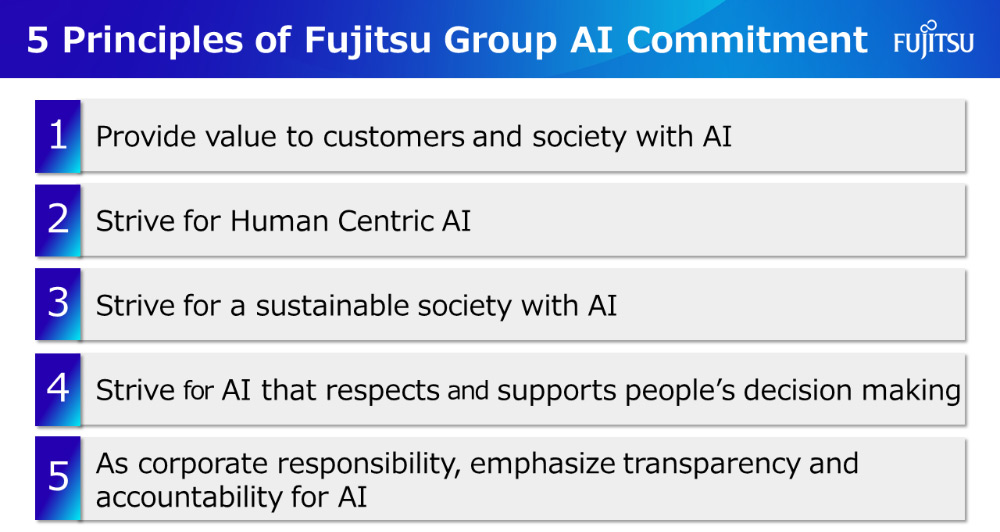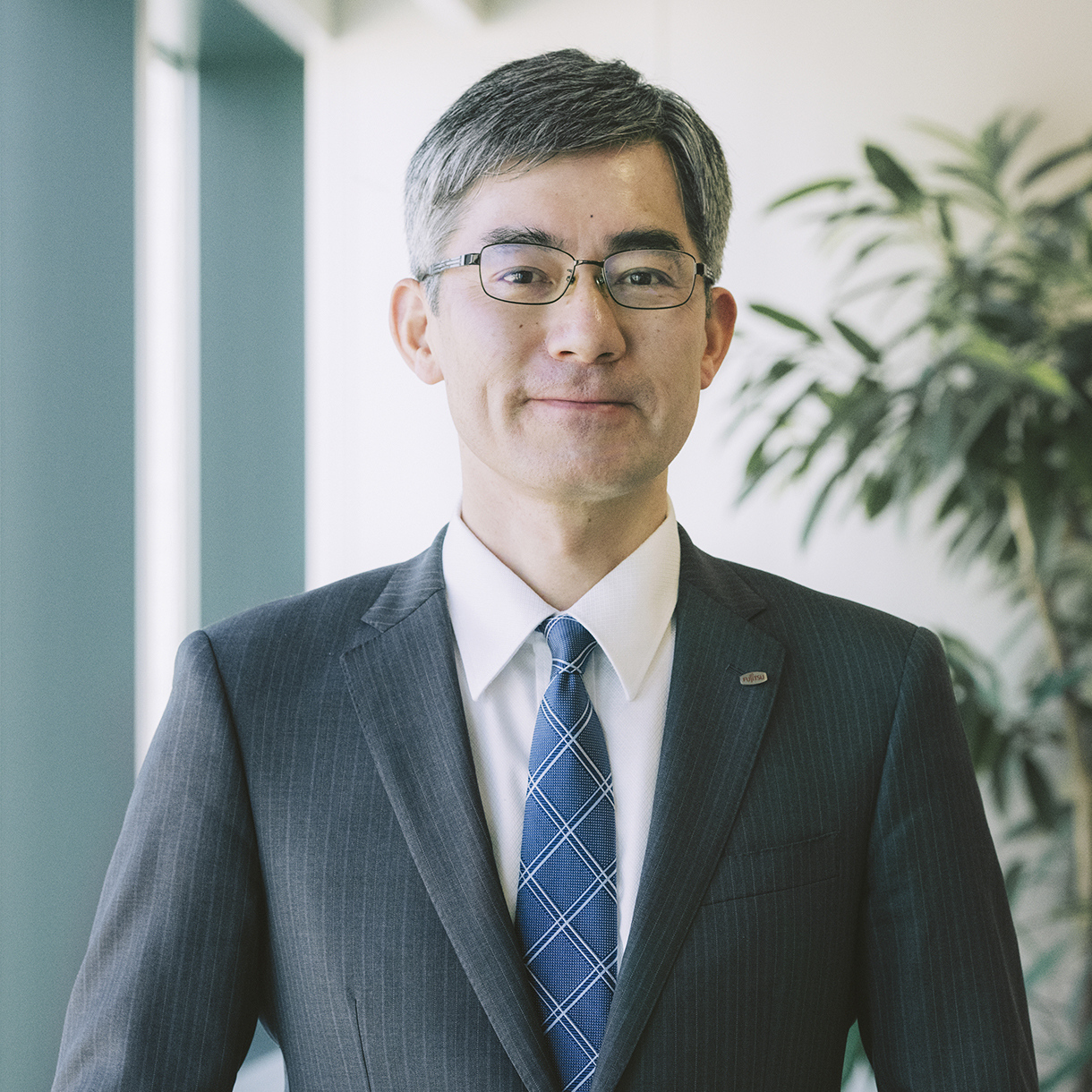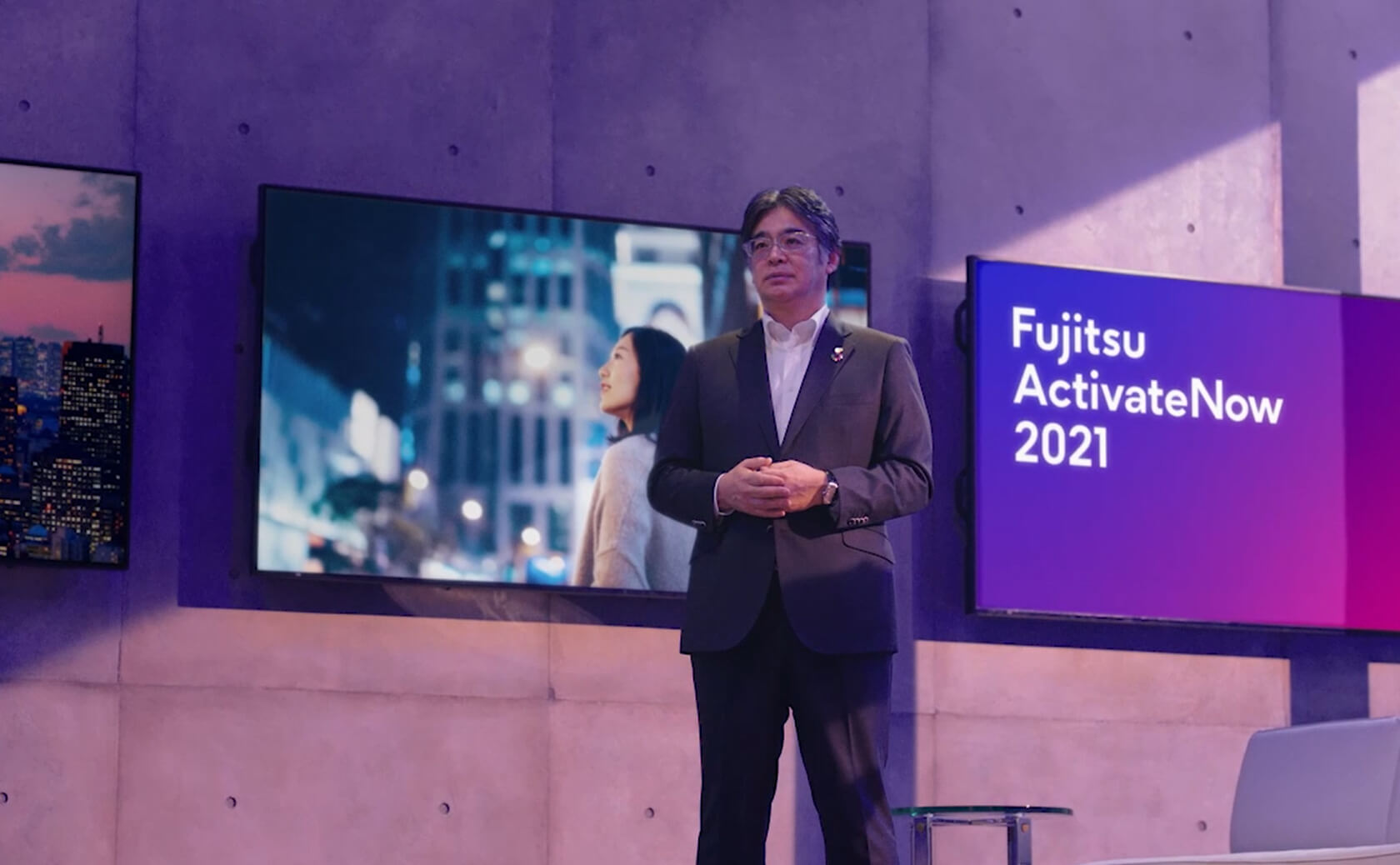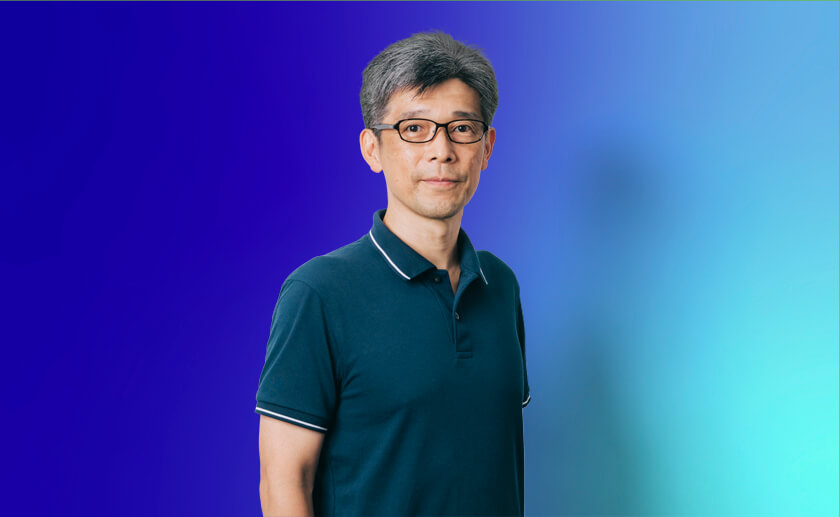Toward Secure and Trustworthy AI that Supports a Sustainable Society - The Relentless Challenge of AI Ethics and Their Penetration
Fujitsu / April 25, 2022
While the application of AI in all industrial fields is expected to solve social issues around the world, ethical perspectives are becoming an issue on how AI should be used.
Fujitsu's Purpose is "to make the world more sustainable by building trust in society through innovation."
In order to accelerate the penetration of cutting-edge technologies into society and to ensure trust, in February 2022 Fujitsu established the AI Ethics and Governance Office as a group command post for the promotion of AI ethics.
The office was set up to strengthen "trust" in Fujitsu by implementing measures to actively promote ethics related to the research, development, and implementation of advanced technologies.
What is the point of AI ethics? How should we promote governance to utilize responsible and trustworthy AI? We interviewed with Junichi Arahori, Head of the AI Ethics and Governance Office, the initiator of this organization.
"AI Ethics" is required now to maximize the value of AI
What do you think about the reasons for the current global demand for AI ethics?
Arahori: AI is certainly a wonderful tool, but on the other hand, various threats and inconveniences have been reported. There is a growing debate on strengthening AI regulations against the oligopoly of giant IT companies, the invasion of privacy by AI, and the manipulation of public opinion and public scrutiny.
AI learns from large amounts of data, statistically captures its trends, and makes predictions. Therefore, while trends are calculated for the entire population, the individuality of each person may be discarded. Moreover, if the data used to train AI has an inherent bias, the results it produces may also have a prejudicial or discriminatory bias.
For example, there is a case of an AI service for a recruiting test. When a company introduced this service for evaluating job applications, the company got embarrassed because the only men were proceeded to the interview test. Then, the training data was examined and found that it had inherent bias - the company had more hired men than women in the past. As a result, the AI recommend was heavily biased toward men. This case can easily happen.
If we blindly use AI without understanding its characteristics or correcting biases, we will make prejudicial or discriminatory decisions. It will be cause of unfairness and inequality.

It means that AI developers and companies that use AI will increasingly need to have high ethical standards in order to avoid problems caused by the nature of AI and human misuse.
Arahori: Yes, AI is a helpful tool that can contribute to the development and evolution of human society and ultimately to the achievement of the SDGs. AI can certainly contribute greatly to health, well-being, climate change avoidance, and the realization of an equitable society.
However, if we blindly use AI's predictions, as in the previous example of gender bias, we could make serious errors in our decisions. Then, ethics are required for the use of AI rerated to privacy and human rights.
That is why management teams companies, that develop, provide, or use AI, need to promote AI ethics governance and education for their employees. It is the first step that all employees understand the advantages and disadvantages from the perspective of ethics, so that end-users also understand the true nature of AI and recognize the possibility of problems. Finally, we can make use of its advantages.
What are the current international trends in AI ethics?
Arahori: Actually, the topic of AI ethics is not a new one. For several years now, the need to consider ethical perspectives when utilizing AI has been emphasized. At the same time, AI has become increasingly pervasive in society where consumers are unaware of its use. Therefore, it is necessary for us to make stronger appeal for the importance of AI ethics to the world at this point in time.

AI ethics governance makes a prosperous future by integrating the management and the field
Arahori-san, you are the head of the AI Ethics and Governance Office, which was established in February 2022. Can you tell us about your organization's mission?
Arahori: Sure. Until now, Research & Development and the business teams and the Legal division have worked closely together to promote ethics initiatives. Our new organization, the AI Ethics and Governance Office, tries to further strengthen our company-wide and comprehensive efforts.
Fujitsu's corporate mission is “to make the world more sustainable by building trust in society through innovation." The “Fujitsu Group AI Commitment” is a good example of this Purpose in terms of the application of AI. And the mission of the AI Ethics and Governance Office is to promote the Fujitsu Group AI Commitment in concrete ways for self-discipline.
We chose the name the "AI Ethics and Governance Office" for the new organization because we wanted to emphasize to the world the importance of AI ethics governance in companies by creating an organization bearing that name ("AI Ethics Governance"). Ethics governance means the creation of mechanisms to enable the practical self-discipline of conceptual ethics. In an era of pervasive AI, companies will certainly be required to address AI ethics. Fujitsu hopes to create safe and secure society by disciplining its own organization, from management to employees, and by spreading its commitment to society as well.
One of Fujitsu's unique approaches to governance in AI ethics governance is not to place responsibility for AI ethics solely on the frontlines, such as AI R&D and business divisions. Rather, we believe that it is the management who must have a deep understanding of AI ethics and be able to speak about it in order to be trusted as a company that provides AI. For this reason, we have established the AI Ethics and Governance Office as an organization under the corporate division, and we have taken the approach of having the president himself participate in discussions on AI ethics governance and reflect them to the management.
Our business covers software, IT service provision, system integration and other cutting-edge technologies. The industry sectors to which we deliver are also varied. Therefore, it is inefficient to apply a single set of rules for ethical guidelines for front-line workplaces. So, rather than simply imposing strict rules, we are working with companies that use AI to examine diverse and agile ways to cooperate in upholding ethics.
In fact, there are not yet many companies in the world which have an organization specialized to AI ethics governance. The AI Ethics and Governance Office was established by Fujitsu in response to the need to change gears and work at a faster pace to achieve a sustainable society through the utilization of AI. The AI Ethics and Governance Office will promote improved governance of AI ethics throughout the Fujitsu Group.
So, this is an advanced initiative even in the world. Incidentally, Arahori-san mentioned earlier the "Fujitsu Group AI Commitment." In 2019, Fujitsu announced the "AI Commitment," incorporating the principles set forth by AI4People, a global forum on AI ethics originating in Europe. Arahori-san, you are also the initiator of the "AI Commitment," correct?
Arahori: Yes, I suggested to establish the commitment. I started this work as my voluntary one. I originally belonged to the Legal division, and my main duties were contract review and M&A. Later, around 2016, when AI ethics began to be discussed in Europe and the U.S., I was stationed in Washington, D.C.
Many people think of California when they think of technology companies in the U.S. In fact, most technology-related laws and regulations are decided in Washington, D.C., not California. In those days, particularly hot topics to be debated in Washington, D.C., were "How should we utilize AI in our society?” and “How can we prevent AI's problems?"
Witnessing such discussions on the front lines, I strongly felt that Japanese society would definitely need to think about preventive measures before AI causes any problems, so I started working on AI ethics on my own as soon as I returned to Japan.
At the time, there was no one around who was working on AI ethics as a job, so I gradually began to organize study sessions with a slowly growing group of volunteers from Fujitsu Research and business divisions. Moreover, Fujitsu Research of Europe was a founding member of AI4People, and so we referenced its achievements and summarized our new commitment. The management agreed to clearly state Fujitsu's AI ethics and announced as the "AI Commitment" within three months.

5 Principles of Fujitsu Group AI Commitment – Excerpt
The establishment of the "AI Ethics and Governance Office" follows on from the "AI Commitment." How will this AI ethics activity of yours expand in the future?
Arahori: We will continue to tell the world that the governance of AI ethics is important for the future of society. We believe it is the best way to create an atmosphere in which it is natural for everyone to think about AI ethics together, from AI providers and user companies that use AI to interact with consumers.
I am sure that many companies that use AI share the same desire to deliver convenience to consumers through a secure system and to create a prosperous society. Therefore, we would like to work together with companies that use AI to learn about AI ethics and create a system to protect consumers.

Providing links between technology and humans is honorable work
I sense extraordinary enthusiasm from your efforts to date. What is the source of your motivation?
Arahori: I have always been interested in computers, including building my own computers. I like new technology. I am not good at mathematics, so I could not become an engineer, but I found it rewarding to be involved in changing the world by using new technology. AI can be very useful if used in a good way. However, it is a waste that it would be highly regulated by being used incorrectly.

You are right.
Arahori: By the way, I have loved bicycles since I was a child. I love bicycles because they multiply the power of my legs many times over. I love the possibilities it gives me. That's a common feature in technologies including AI. What one person can do is limited, but I think technology opens up new possibilities. As you may know, Steve Jobs said, "A computer is a bicycle for the mind."
In that light, how we use technology is important.
Arahori: I agree. It is very important to devise a way to connect technology and humans. My job is to think of ways to do this, and I want to create a culture of trust in technology rather than constraining it with AI ethics.
I also believe that thinking about the correct use of AI, spreading the word about it, and getting rid of regulations that unnecessarily restrict AI will ultimately contribute to supporting innovation among engineers. I would like to continue to do so.

Editor's Picks






